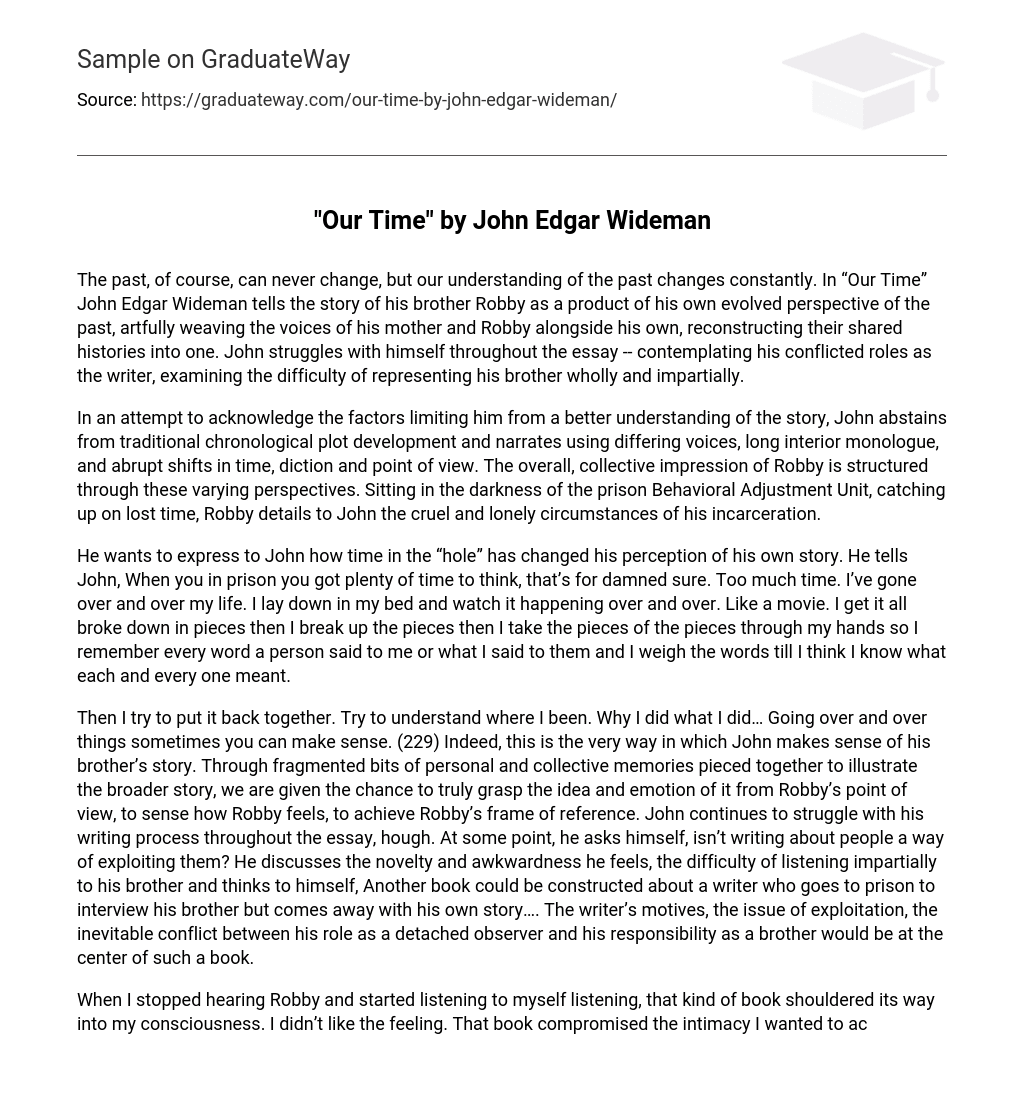The past, of course, can never change, but our understanding of the past changes constantly. In “Our Time” John Edgar Wideman tells the story of his brother Robby as a product of his own evolved perspective of the past, artfully weaving the voices of his mother and Robby alongside his own, reconstructing their shared histories into one. John struggles with himself throughout the essay — contemplating his conflicted roles as the writer, examining the difficulty of representing his brother wholly and impartially.
In an attempt to acknowledge the factors limiting him from a better understanding of the story, John abstains from traditional chronological plot development and narrates using differing voices, long interior monologue, and abrupt shifts in time, diction and point of view. The overall, collective impression of Robby is structured through these varying perspectives. Sitting in the darkness of the prison Behavioral Adjustment Unit, catching up on lost time, Robby details to John the cruel and lonely circumstances of his incarceration.
He wants to express to John how time in the “hole” has changed his perception of his own story. He tells John, When you in prison you got plenty of time to think, that’s for damned sure. Too much time. I’ve gone over and over my life. I lay down in my bed and watch it happening over and over. Like a movie. I get it all broke down in pieces then I break up the pieces then I take the pieces of the pieces through my hands so I remember every word a person said to me or what I said to them and I weigh the words till I think I know what each and every one meant.
Then I try to put it back together. Try to understand where I been. Why I did what I did… Going over and over things sometimes you can make sense. (229) Indeed, this is the very way in which John makes sense of his brother’s story. Through fragmented bits of personal and collective memories pieced together to illustrate the broader story, we are given the chance to truly grasp the idea and emotion of it from Robby’s point of view, to sense how Robby feels, to achieve Robby’s frame of reference. John continues to struggle with his writing process throughout the essay, hough. At some point, he asks himself, isn’t writing about people a way of exploiting them? He discusses the novelty and awkwardness he feels, the difficulty of listening impartially to his brother and thinks to himself, Another book could be constructed about a writer who goes to prison to interview his brother but comes away with his own story…. The writer’s motives, the issue of exploitation, the inevitable conflict between his role as a detached observer and his responsibility as a brother would be at the center of such a book.
When I stopped hearing Robby and started listening to myself listening, that kind of book shouldered its way into my consciousness. I didn’t like the feeling. That book compromised the intimacy I wanted to achieve with my brother. (218) John realizes that if he cannot listen to Robby, really listen to him, without the fog of fraternal emotion or pre-conceived notions of the past, he will get the story all wrong. He will fail to truly understand it as Robby does and the resulting representation of Robby will be skewed and inaccurate.
John knows he must break the habit of “listening to himself listen” –paying more attention to his inner reaction to Robby’s words than to the words themselves—and he thinks to himself, “That habit would destroy any chance of seeing my brother on his own terms; and seeing him in his terms, learning his terms, seemed the whole point of learning his story… I had to root my fiction-writing self out of our exchanges. I had to teach myself to listen… Tame the urge to take off with Robby’s story and make it my own” (217). I had to depend on my brother’s instincts, his generosity. I had to listen, listen” (220). Understanding is a complicated process… Perhaps learning to understand your own brother is even more complicated. As soon as John breaks free from the solipsism of big-brotherhood, and really hears Robby’s voice, the struggle ends. He begins to draw the connections between the fragmented bits and pieces: I just remember differently… Strange thing is my recollections return through the door he opened. My memories needed his.
Maybe the fact that we recall different things is crucial. Maybe they are the foreground and background, propping each other up… As he stitches his memories together they bridge a vast emptiness. The time lost enveloping us all. Everything. And hearing him talk, listening to him make something of the nothing, challenges me. My sense of the emptiness playing around his words, any words is intensified. Words are nothing and everything. If I don’t speak I have no past. Except the nothing, the emptiness.
My brother’s memories are not mine so I have to break into the silence with my own version of the past. My words. My whistling in the dark. His story freeing me, because it forces me to tell my own. (235) John attains the level of understanding he was searching for by identifying himself –memories, conscience and all—with Robby instead of against him. Shifting time and points of view provides the mechanism for the evolution of perspective and, through it, John reconciles himself to reality and comes to term with the past.





